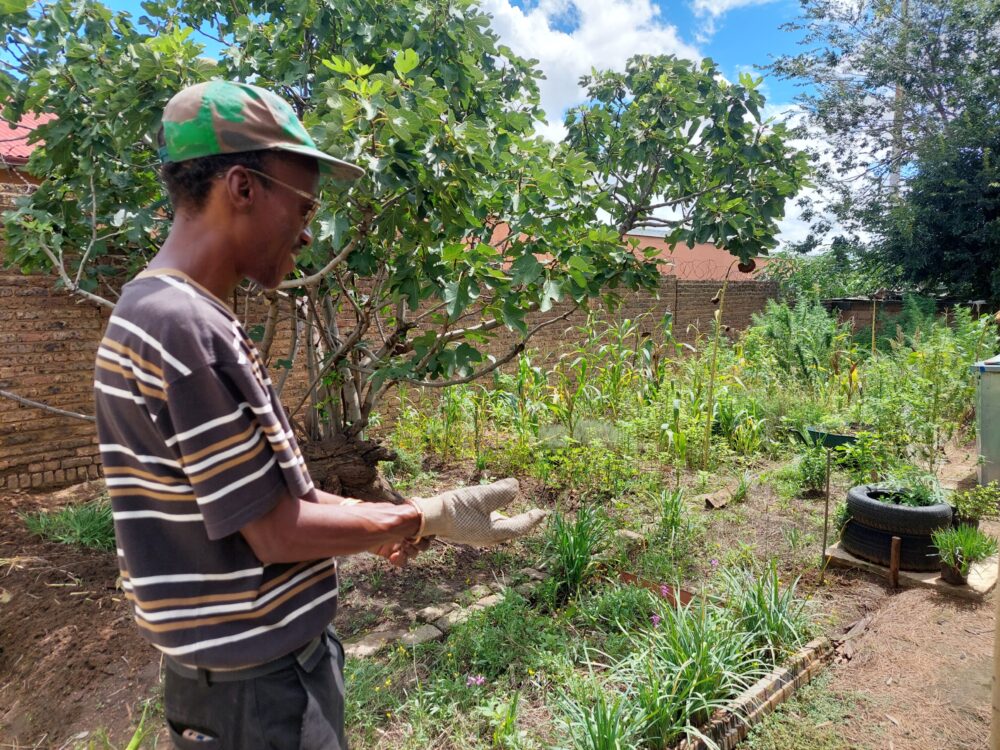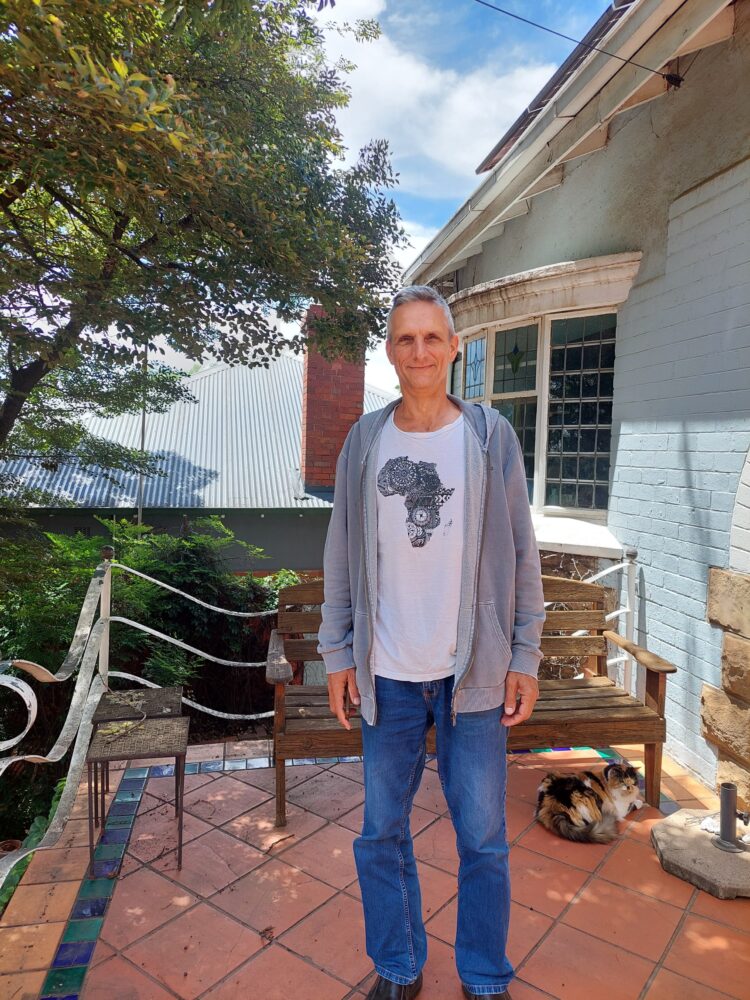Good food makes good neighbours: The Brixton community cook-out, which formed part of the LongKitchen series of events. Photo: Nkululeko Motloung LongKitchen
At a community art studio in Braamfontein, Johannesburg, a small group of local farmers, food entrepreneurs, artists and activists gathered for a special event.
It was the first in a series of events that would bring together people across the city — from various backgrounds — to explore individual and collective relationships with food and roles within the food system.
In this wealthiest city in Africa, food insecurity affects over 2 million people, while megacorps rule the country’s food industry.
And, with food inflation on the rise, grocery bills are soaring throughout South Africa, raising many questions about the nation’s reliance on the mainstream industrial food system, especially in the context of increasing unemployment, geopolitical instability and the climate crisis.
Aiming to explore this notion, an informal collective embarked on an initiative called the LongKitchen.
Funded by Food & Trees for Africa, the LongKitchen is a series of events in which people from various areas and different spheres of the community come together for guided walks in the city centre, purchasing food from street traders, collaborating to eat a shared meal and sharing stories of their lived experiences, endeavours and challenges.
Over the course of the project, these events have evolved, introducing new elements with each iteration — from harvesting fresh vegetables at a thriving urban farm in Soweto to Brixton’s community cook-out, where residents came together to prepare food grown in their immediate surroundings, engaging in conversation about community cohesion and local-level food resilience.
In a deep dive into this initiative, one LongKitchen participant, Louise Denysschen Greeff, took a special interest in the process and led interviews with several other participants from across these spheres, gathering their stories and highlighting the connections between them.
The conversations unveiled challenges, but also a shared hope, stemming from the multiplicity of efforts on the ground and a collective vision to achieve a just food future.
Siyabonga Mngoma, founder of Abundance Wholesome Foods, found the lack of connection between people and communities limits our opportunities for leveraging off each other and finding solutions to common problems.
Mngoma’s food journey began through her quest to develop a healthier lifestyle.
Spurred by a family history of diabetes and heart disease, she started exploring organic farming. She quickly discovered that her strength lay in marketing. She also realised that access to markets was a challenge for most farmers.
From these realisations, Siyabonga launched Abundance Wholesome Foods — a local platform that sources organic fresh produce from small-scale farmers, bringing it to urban Gauteng.
 Homegrown: LongKitchen participant and host Mphathi Motha at his farm in Orlando East, Soweto. Photo: Louise Denysschen Greeff
Homegrown: LongKitchen participant and host Mphathi Motha at his farm in Orlando East, Soweto. Photo: Louise Denysschen Greeff
During this process, she learned about food waste and carbon emissions, leading her to create an enterprise mindful of these elements.
Siyabonga found herself drawn to the farmers she worked with, some of whom live in townships, hardly making money but continuing to invest their time and energy growing organic food, most of which leaves the townships for wealthier suburban areas.
Her goal was to help people with lifestyle diseases get access to quality, nutritious food. But she found herself catering to an already health-conscious, middle-class market.
“Township people believe the food grown in those farms is “not for us”. It’s food that’s grown for other people. It’s going to be taken to other places. [This] didn’t sit well with me.”
Mngoma’s vision is one where farmers are taken care of, and paid fairly, and communities have access to fresh produce grown responsibly in their locales.
“Everybody eats food and everybody deserves to eat good food.”
Mphathi Motha was the host of the Soweto event, where the food was harvested directly from his farm.
Motha, who is the founder of Soul Indigenous Life, found his place in the food system channeling the traditions of his grandmother on the very land where she lived.
“My grandmother was a food grower — a full-time food grower. She farmed until her last days.”
Delving into his grandmother’s history, Motha discovered that she was also teaching children at the primary school she founded to grow food.
 Green future: Stephen Greenberg, an agro-ecology researcher and LongKitchen participant. Photo: Louise Denysschen Greeff
Green future: Stephen Greenberg, an agro-ecology researcher and LongKitchen participant. Photo: Louise Denysschen Greeff
Motha had already decided he wanted to farm but did not have land. He recalled visiting his grandparents during holidays and the yard being abundant with vegetables and fruit trees.
He decided to revive this food garden and in 2017, through many hours of hard work and dedication, Soul Indigenous Life was born.
By 2020, when Covid-19 hit, the business side of the project was in place — a milestone achieved without external funding. Motha and his business partner at the time were learning to navigate their independence, working with what they had and seeing how they could grow and sustain themselves as young, small-scale farmers.
The challenge was building relationships and finding ways to distribute their produce.
Some of these answers came in the form of farmers’ markets and others through gatherings such as iZindaba Zokudla — a multi-stakeholder engagement for creating opportunities and developing structures to support emerging black farmers in Johannesburg.
Much of Motha’s journey involved acquiring knowledge — learning about the soil, the environment, plants and the challenges of food growing. And like that, he became part of a movement, bringing food sovereignty into the township.
Motha’s mission is to produce high-quality, organic food. There are many like him and Mngoma, wanting to effect change.
However, for a food system to truly transform, changes at a higher level are needed. This is where policy comes in.
Stephen Greenberg, an agro-ecology researcher and advocate, first became interested in food security while wandering the country after being expelled from university for involvement in political protests in the democratic transition period between 1994 and 1995.
“I think, at that time, it really became very apparent that food is a highly crucial thing, [and] you kind of realise that as soon as you don’t have money, [and] you don’t have a stable environment.”
The corporate concentration in the food sector struck him from early on and, in 2016, Greenberg published research looking at ownership and control in South Africa’s food system. He has since worked between NGO networks and academia, finding his focus in agro-ecology and just transitions in the food system.
Greenberg found that, since Covid, there has been a reconnection between previously siloed sectors, with greater fusion and collaboration among people working on agriculture, water, climate and environment. Riding on this collaborative energy, he contributes to the coordination of emerging networks on agro-ecology and food systems.
Agro-ecology is described as a science, a movement and a practice, combining the scientific disciplines of agronomy and ecology with indigenous and local knowledge and the political economy. It has a practical focus on restoring and protecting nature and building a sustainable food system.
“It’s about [the] transformation of society. It’s not just about a few practices in the field.”
While many challenges remain, including limited resources, the wider movement has made significant inroads in the policy environment and Greenberg assures that there is definite movement forward.
An important issue he raises is around high and inflexible standards for organic certification designed for premium markets, which can be barriers to entry for homestead producers and smallholders, highlighting the need for more conversations around food justice.
“The image is that organic produce is going to achieve a premium in the market because of its ecological production and health benefits, whereas agro-ecology is about healthy, clean food being the norm.
“It’s not about premiums. You don’t want to price people out of the market. You want the resource-poor people to have access to clean, healthy food.”
Greenberg, Motha and Mngoma are three of many rising from civil society to tackle the unjust and unsustainable food system in the country and across the continent.
Around 40 participants attended the LongKitchen events, each coming to the table with their own stories, challenges and experiences.
According to organiser Claire Rousell, the initiative brings changemakers together in a collaborative and creative space to reaffirm that they are part of a dynamic network and highlight alternative ways people can access healthy, affordable, locally grown food within their neighbourhoods.
Through these events, people are reminded of their connectedness — the connections to each other, where their food comes from and the histories of their relationships to land.
The goal for the LongKitchen is to have more people collaborating for just food futures and together find ways in which we will continue to survive and thrive in increasingly uncertain times. “Some people say we need a longer table. We say, ‘Make the kitchen longer’.”